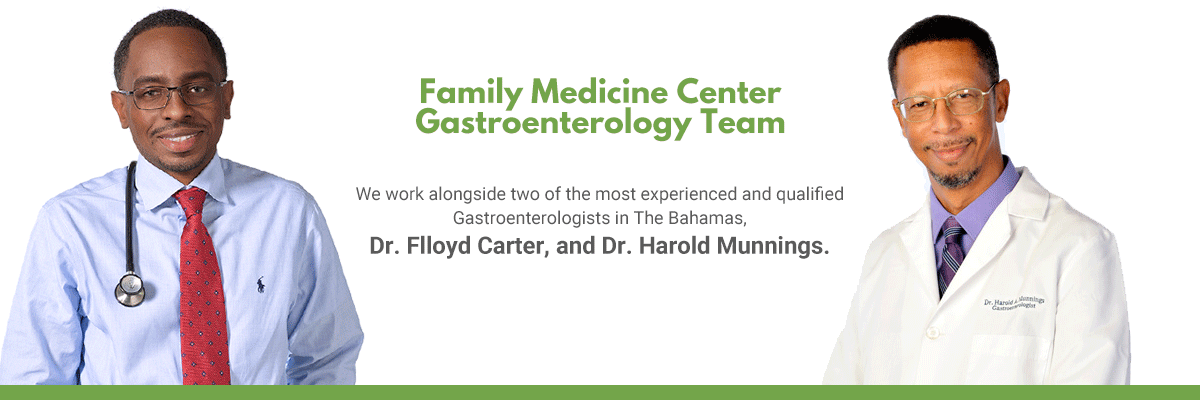
• 50% off self-pay
• Insurance co-pay & co-insurance waived
(if deductible met)
Special runs from March 1 - 31
50% special on colonoscopies in MARCH - $1500 before VAT
The regular cost of a colonoscopy in The Bahamas is $3000 before VAT.
Take advantage of this offer, especially if you are 45 years or older.
If you have risk factors, such as an immediate family member who has had colon cancer, you should start screening at age 40.
Insured Persons:
• If deductible is not met - the patient pays the deductible plus VAT. Co-payment & co-insurance are waived.
• If deductible is met - the patient’s co-pay & co-insurance are waived.
Self-Pay Persons:
• The colonoscopy is $1,500.00 plus VAT.
Labs – Pathology
• If a polyp or polyps are found the patient is responsible for paying for them.
• Insured: if deductible is not met - patient will have to meet their deductible, plus 20% co-pay plus VAT
• If deductible is met - patient will pay 20% co-pay plus VAT.
• Self-Pay will pay for the labs in full.
Schedule your appointment today!

What is a Colonoscopy?
Colonoscopy is a test that can prevent colon cancer or find it early when it’s easier to treat and cure. The test is done by a gastroenterologist - a specialist trained to find and remove polyps from the colon and check for signs of cancer.
Polyps are growths in the colon that have the potential to turn into cancer. A colonoscope is used during a colonoscopy. It is a thin, flexible tube that has a light, camera, and a tool to remove polyps or to collect cells for testing.
Why is Colonoscopy Important?
Colonoscopies can find precancerous polyps so they can be removed before they turn into colorectal cancer. Colorectal cancer, often referred to as colon cancer, affects both men and women and is the third most common cancer in The Bahamas. It is also the third leading cause of cancer-related deaths in the Bahamas.
The risk of developing colorectal cancer increases with age. More than 90 percent of cases occur in people 50 or older. Getting screened for colon cancer, by having a colonoscopy, could save your life.
• A colonoscopy is a simple and effective way to check for colon cancer and to remove suspicious colon polyps.
• Polyps in the colon can become cancerous. Removing polyps during a colonoscopy helps prevent the development of colorectal cancer.
• Once a polyp turns into cancer, it can grow for years before symptoms occur. Early-stage colorectal cancers can be detected through colonoscopy when no symptoms are present, making it easier for your physician to treat and cure your cancer.
• Do not avoid colonoscopy just because you have no symptoms. If colonoscopy is only performed after you have symptoms of colorectal cancer, treatment is far more complicated, and your chances of surviving the disease are significantly reduced.
What To Expect?
A colonoscopy takes 30 to 60 minutes. You will be lightly sedated. The sedative and pain medicine should keep you from feeling much discomfort during the exam.
You will need to remain at Family Medicine Center until the sedative wears off, about one to two hours, before going home. It is advisable to arrange for some one to pick you up.
You may feel some cramping or a sensation of having gas, but this usually passes quickly. You can resume your normal diet.
When To Get Screened?
Colon screening is recommended for all average-risk men and women at the age of 45.
However, if you have a family history of colorectal cancer, have an inflammatory condition or are African American, you should begin screening earlier.
Talk to your doctor to determine when to begin screening.
How To Prepare For A Colonoscopy?
Before a colonoscopy, the colon must be thoroughly cleansed. This cleaning out process is called bowel prep.
Your doctor will give you instructions for a bowel prep. You must have a clear liquid diet for 24 to 72 hours before your procedure.
If your colon is not completely clean, the doctor may not be able to clearly see your entire colon. This may lead to missed polyps or cancer. For the bowel prep, you will drink a laxative that causes frequent stools and diarrhea. Consider staying home during this time since you will need to use the bathroom very often.
